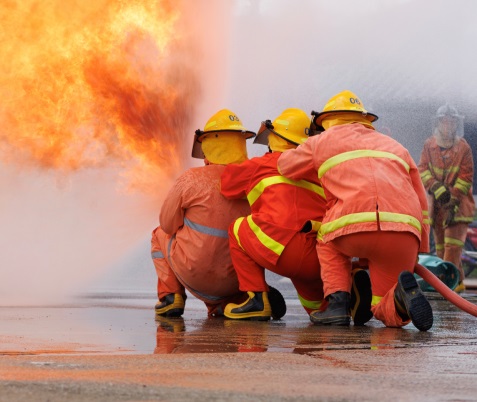How to Become a Correctional Officer - Certification and Training
Approximately 387,500 corrections employees are working in the United States, according to the US Bureau of Labor Statistics (BLS). Facilities that provide support services employ 5% of corrections officers, while 4% work in federal government agencies. Correctional officers are employed in the highest numbers within the Federal Bureau of Prisons.
Correctional officers play a vital role in maintaining order and safety within prisons, jails, and other correctional facilities. This career path offers unique challenges and opportunities for those interested in law enforcement and criminal justice. A correctional officer’s primary responsibilities include supervising inmates, enforcing rules, and ensuring the security of both staff and prisoners.
The career path of a correctional officer can be both rewarding and demanding. It requires individuals to possess strong communication skills, physical fitness, and the ability to remain calm under pressure. Correctional officers must also be prepared to work in potentially dangerous environments and deal with difficult situations daily.
For those considering this career, it’s important to note that most entry-level positions require a high school diploma or GED. While higher education is not always mandatory, pursuing additional training or degrees can lead to better job prospects and opportunities for advancement within the field. The correctional officer career path offers various specializations and potential for growth, making it an intriguing option for individuals seeking a stable and meaningful profession in the criminal justice system.
Becoming a Correctional Officer
Becoming a correctional officer involves meeting specific educational, physical, and training requirements. Candidates must undergo a rigorous application process and complete specialized training to prepare for this demanding career.
Educational and Basic Requirements
To become a correctional officer, applicants typically need a high school diploma or GED. Some institutions may prefer candidates with college credits or degrees in criminal justice or related fields. The minimum age requirement is usually 18 or 21, depending on the jurisdiction. US citizenship is often mandatory for federal positions.
Background checks are a crucial part of the application process. Candidates must have a clean criminal record and pass drug tests.
Physical Fitness and Health Standards
Physical fitness is essential for correctional officers. Applicants must pass rigorous physical tests that assess strength, endurance, and agility.
Common assessments include:
- Push-ups and sit-ups
- 1.5-mile run
- Obstacle courses
Medical examinations ensure candidates are in good health. Vision and hearing tests are standard. A psychological evaluation is also often required to assess mental fitness for the job’s demands.
Training and Certification
Successful applicants attend a training academy to learn essential skills and knowledge. Training typically lasts several weeks to months.
Academy curriculum includes:
- Self-defense techniques
- Firearms training
- Legal procedures
- Crisis management
Upon completing the academy, officers receive certification. Some states require additional on-the-job training. Ongoing professional development is also often necessary to maintain certification and advance in the career.
Find Your Online Criminal Justice Program
| Quick Facts: Correctional Officers and Bailiffs | |
|---|---|
| 2023 Median Pay ?The wage at which half of the workers in the occupation earned more than that amount and half earned less. Median wage data are from the BLS Occupational Employment and Wage Statistics survey. In May 2023, the median annual wage for all workers was $48,060. | $53,290 per year $25.62 per hour |
| Typical Entry-Level Education ?Typical level of education that most workers need to enter this occupation. | High school diploma or equivalent |
| Work Experience in a Related Occupation ?Work experience that is commonly considered necessary by employers, or is a commonly accepted substitute for more formal types of training or education. | None |
| On-the-job Training ?Additional training needed (postemployment) to attain competency in the skills needed in this occupation. | Moderate-term on-the-job training |
| Number of Jobs, 2023 ?The employment, or size, of this occupation in 2023, which is the base year of the 2023-33 employment projections. | 387,500 |
| Job Outlook, 2023-33 ?The projected percent change in employment from 2023 to 2033. The average growth rate for all occupations is 4 percent. | -6% (Decline) |
| Employment Change, 2023-33 ?The projected numeric change in employment from 2023 to 2033. | -25,100 |
Daily Duties and Work Responsibilities
Correctional officers perform a wide range of tasks to maintain order and safety within correctional facilities. Their responsibilities encompass security, inmate supervision, communication, counseling, and crisis management.
Security and Supervision
Correctional officers enforce rules and keep order within prisons and jails. They conduct regular head counts and monitor inmate behavior to ensure safety and security. Officers patrol designated areas, watching for signs of trouble or illegal activities.
They inspect cells, common areas, and visitors for contraband. Correctional officers also supervise inmates during meals, recreation, and work assignments. They maintain a vigilant presence to prevent escapes, violence, and other infractions.
Officers must always remain alert and observant. They use surveillance equipment and conduct physical checks to maintain a secure environment. In some cases, they may need to employ self-defense techniques or restraints to control unruly inmates.
Communication and Counseling
Effective communication is crucial for correctional officers. They interact with inmates, colleagues, and supervisors throughout their shifts. Officers must clearly convey rules, expectations, and instructions to inmates.
They document incidents and write detailed reports on inmate behavior and facility operations. Correctional officers often serve as mediators, resolving conflicts between inmates through effective communication.
Crisis Management and Compliance
Correctional officers must be prepared to respond swiftly and effectively to emergencies. They receive training in crisis intervention, first aid, and emergency response procedures. During incidents such as fights, medical emergencies, or attempted escapes, officers take immediate action to control the situation.
They coordinate with other staff members and follow established protocols to manage crises. Officers must remain calm under pressure and make quick decisions to ensure the safety of inmates, staff, and visitors.
Compliance with institutional policies and legal regulations is essential. Officers ensure that inmates’ rights are protected while maintaining order. They follow strict guidelines for the use of force and adhere to ethical standards in all interactions.
Career Progression and Opportunities
Correctional officers have various paths for growth and specialization within their field. Career advancement opportunities exist at both state and federal levels, with options to move into specialized units or higher-ranking positions.
Career Development and Advancement
Correctional officers can advance their careers through experience, education, and training. Many institutions offer career progression programs that allow officers to move up the ranks. Entry-level positions often lead to roles such as sergeant, lieutenant, captain, or warden.
Continuing education is crucial for advancement. Many officers pursue degrees in criminal justice or related fields to enhance their qualifications. Professional development courses and certifications can also boost career prospects.
Salary increases typically accompany career progression. The median annual wage for correctional officers varies by state and institution type. Top-paying states often offer higher salaries to attract and retain qualified personnel.
Specialized Units and Federal Employment
Correctional officers can pursue roles in specialized units within their facilities. These may include:
- Emergency response teams
- K-9 units
- Transportation units
- Training instructors
Federal employment offers additional opportunities for correctional officers. The Federal Bureau of Prisons operates facilities nationwide and provides competitive pay and benefits. Federal correctional officers often enjoy higher job satisfaction and more diverse job openings.
Federal positions may require additional qualifications or experience. However, they can lead to increased job security and opportunities for advancement within the federal system.
Challenges and Rewards for Correctional Work
Correctional officers face demanding responsibilities while playing a crucial role in the criminal justice system. Their work involves maintaining security, managing inmates, and supporting rehabilitation efforts.
Emotional and Physical Demands
Correctional work requires exceptional emotional control and physical stamina. Officers must remain calm and composed in high-stress situations, often dealing with hostile or unpredictable inmates. They need to make quick decisions to ensure the safety of both staff and prisoners.
The work environment can be dangerous, with potential exposure to violence and confrontations. Physical fitness is essential, as officers may need to restrain inmates or respond to emergencies. Long shifts, including nights and weekends, are common.
Maintaining custody and implementing security measures are primary duties. Officers must always stay vigilant, conducting regular checks and searches to prevent the influx of contraband and ensure facility rules are followed.
Contributing to Rehabilitation and Reintegration
Correctional officers play a vital role in offender rehabilitation and reintegration efforts. They oversee and support various educational programs and vocational training initiatives aimed at reducing recidivism rates. Officers often provide guidance and mentorship to inmates, helping them develop life skills and prepare for life after release. This aspect of the job can be particularly rewarding as it contributes to positive societal change.
Conflict resolution is another key skill in inmate management. Officers may often need to de-escalate tense situations and mediate disputes between prisoners. Effective communication and interpersonal skills are crucial for maintaining order and fostering a rehabilitative environment.
Frequently Asked Questions
Aspiring correctional officers often have questions about qualifications, salaries, recruitment, training, and job requirements. Federal and state-level positions may have some key differences in roles and responsibilities.



